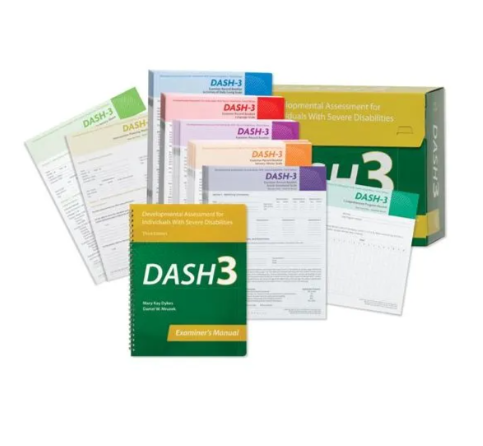The DASH-3 is a criterion-referenced measure of specific skill levels in persons of all ages who have severe and/or multiple physical/sensory disabilities, including persons with severe and profound intellectual disability (“mental retardation”) and autism spectrum disorders. The scales are also appropriate for individuals with mild to moderate disabilities; those who have single disabling conditions (e.g., individuals with visual impairment or paraplegia), and children who are functioning chronologically from birth to 6 years of age.
Test Structure:
Typically, the examiner completes each scale by directly observing the examinee during
evaluation sessions, a process that requires from 2 to 3 hours. When time is a factor, or when
the objective is to compare skills across settings (e.g., home and school), the examiner can
complete the test by interviewing parents, teachers, or others who know the examinee well.
Alternatively, these individuals can respond to DASH-3 items independently, with examiner
follow-up.
Basals and ceilings are used to determine where to start and stop the administration. The examiner or informant rates each item on a 5-point scale, ranging from "Task Resistive" to "Independent Performance." Item scores are totaled to arrive at the examinee's developmental age for each scale and subscale and for overall performance. In addition to the five scales, the DASH-3 system includes three accompanying forms to assist in developing intervention priorities and strategies and track progress (Cumulative Summary Sheet, Intervention Planning Worksheet, and the Comprehensive Program Record).
Scales:
• Sensory-Motor Scale: measures the ability to receive and respond to environmental stimuli, as well as move reflexively and voluntarily. It has four subscales: Reflexes, Gross Motor, Sensory, and Hand Skills.
• Language Scale: measures the ability to understand and use communicative behaviors and purposeful language. The subscales are nonsymbolic communication skills (N), expressive language (E), or receptive language (R).
• Social-Emotional Scale: assesses awareness and understanding of self and of others, including interactions with others and social skills.
• Activities of Daily Living Scale: measures an individual’s level of self-sufficiency and personal independence relative to daily living skills. This scale has five subscales: Feeding, Dressing, Toileting, Home Routines, and Travel and Safety.
• Academics Scale: measures the ability to learn and use information related to concept formation, basic reading skills, and number skills. It has two subscales: Preacademic Skills and Academic Skills.
The DASH-3 Complete Kit includes:
• Examiner’s Manual
• Comprehensive Program Record Forms (25)
• Intervention Planning Worksheets (25)
• Cumulative Summary Sheets (25)
• Academics Scales (10)
• Activities of Daily Living Scales (10)
• Language Scales (10)
• Sensory-Motor Scales (10)
• Social-Emotional Scales (10)
Mary Kay Dykes / Daniel W. Mruzek
(DASH-3) Developmental Assessment for Students
with Severe Disabilities - Third Edition
Ages: 6 months through Adult
Administration: Individual; 2-3 hours



